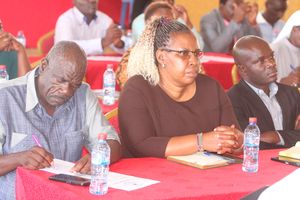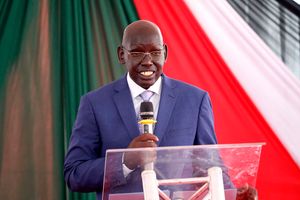
Students in class in this picture taken on August 28, 2024. Poor performance in mathematics is one of the reasons for making it optional at senior school level.
In the past three years, close to two million candidates have scored between D and E in mathematics in the Kenya Certificate of Secondary Education (KCSE) examinations.
942,742 of candidates who sat the KCSE exam since 2020 scored a grade E in mathematics, 602,132 had a D- (minus) while 399,225 had a score of D. This translates to 72.22 percent of the total candidates scoring D and below in mathematics in the three years.
The details have emerged as debate rages over making mathematics an optional subject at senior school under the competency-based curriculum (CBC). Poor performance in the subject is one of the reasons for making it optional at senior school level.
The other reasons are a shift in curriculum content, the need to reduce waste in the education system, and pre-career specialisation. Senior school will be introduced from January 2025.
The revelation last week that mathematics will not compulsory has drawn mixed feelings from Kenyans. It has been compulsory at basic education under the 8-4-4 curriculum, which is being phased out.
According to the government, poor performance in mathematics affects students' progression to tertiary education, as mathematics is a compulsory subject even for students pursuing careers without mathematics as a core requirement.
In the KCSE exam, the subject is included in the calculation of a candidate's average grade, along with the best performing language among English, Kiswahili or Kenyan Sign Language, and the best performing five other subjects.
“We’ve been wasting a lot of children as mathematics may not be relevant to them. You look at what’s been serving you and what can be improved. Mathematics as a selective subject at the pre-career stage is a global practice and not a new phenomenon to the Kenyan context,” explained Prof Charles Ong’ondo, the CEO of the Kenya Institute of Curriculum Development (KICD).
“Mathematics for junior school covers all the general knowledge in mathematics for one to be numerically literate. For those pursuing arts, sports and humanities, mathematics is still available for them but it’s not compulsory,” Prof Ong’ondo told Nation.
“Under CBC, critical thinking and problem solving is a core competency. It is important to note that while the foundational skills are developed by mathematical and logical thinking, this core competency is not a preserve of mathematics. The curriculum in all learning areas and subjects has made provision for development of this core competency,” he explained.
His counterpart at the Kenya National Examinations Council (Knec), Dr David Njeng’ere, said that making mathematics compulsory only benefits a few learners.
“How is mathematics helping if 30 percent are scoring Es? We’re forcing them to do what’s not aligned to their potential, ability and interest. Let’s start by appreciating that not all of us will fit in the formal careers,” he said.
Dr Njeng’ere explained that CBC shifts focus from subjects to the core competencies that are integrated in all learning areas. The competencies are: communication and collaboration, critical thinking and problem solving, imagination and creativity, citizenship, self-efficacy, digital literacy and learning to learn.
“The current situation is only excellent for 20 percent of the learners. The problem has been the 80 percent [who don’t do well]. You can’t develop the country with 20 percent of the people and leave out 80 percent of them,” he told Nation.
Dr Njeng’ere explained that under CBC, functional abilities in mathematics are meant to be achieved in upper primary (Grade 4, 5 and 6) and junior school (Grade 7, 8 and 9).
“It’s expected that by the end of Grade 9, the functional mathematics a learner needs to navigate their chosen careers will have been acquired. Senior school curriculum is advanced and meant for pre-tertiary education,” Dr Njeng’ere said.
According to Prof Ong’ondo, senior school is a pre-career stage where learners will study seven subjects. The core subjects will be English, Kiswahili, physical education and community service learning. Learners will then be expected to select an additional three subjects to match their personal choices and career goals.
“Mathematics will be a prerequisite for careers related to STEM (science, technology, engineering and mathematics), business studies and some in sports science. In essence therefore, the majority of learners at senior school will select mathematics due to its essence in these careers. Ultimately the decision to study mathematics in the humanities, languages and literature tracks of senior school depends on the individual interests, career goals and aptitude for the subject,” he explained.
Enrolment in senior school will be based on choice of career pathways. These are: science, technology, engineering and mathematics (STEM), social sciences, and arts and sports.
Schools will be categorised as either triple pathway schools, which will offer all the career pathways, or double pathway schools that will offer STEM and a choice of the other two.












